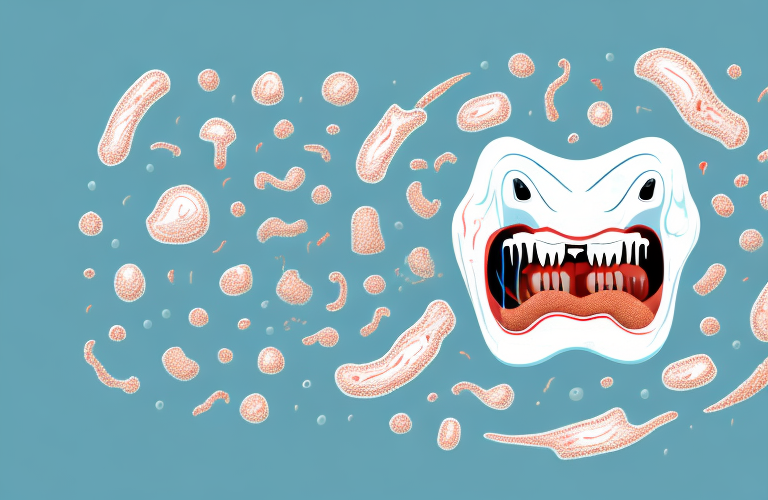Gingivitis is a common oral health condition that affects millions of people around the world. It is usually the result of poor oral hygiene, but can also be caused by other factors such as smoking, genetics, and certain illnesses. In this article, we will explore all aspects of gingivitis including its causes, symptoms, diagnosis, and treatment options, as well as the steps you can take to prevent and manage the condition.
What is Gingivitis?
Gingivitis is an inflammation of the gums that is caused by an excess of bacteria and plaque buildup on the teeth. When left untreated, this condition can progress to a more serious form of gum disease known as periodontitis. Gingivitis is characterized by symptoms such as red, swollen, and tender gums, bleeding when brushing or flossing, and bad breath.
It is important to note that gingivitis can be prevented through proper oral hygiene practices such as brushing twice a day, flossing daily, and visiting the dentist regularly for cleanings and check-ups. Additionally, a healthy diet low in sugar and high in nutrients can also help prevent the development of gingivitis. If you suspect that you may have gingivitis, it is important to seek treatment from a dental professional as soon as possible to prevent further damage to your gums and teeth.
Causes of Gingivitis
The main cause of gingivitis is poor oral hygiene habits, which can lead to a buildup of plaque and bacteria on the teeth and gums. Other factors that can contribute to the development of gingivitis include smoking, hormonal changes, diabetes, certain medications, and genetic predisposition.
In addition to the above mentioned causes, certain lifestyle factors can also increase the risk of developing gingivitis. These include a diet high in sugar and carbohydrates, stress, and a weakened immune system. It is important to maintain good oral hygiene habits and make healthy lifestyle choices to prevent the development of gingivitis.
Symptoms of Gingivitis
Gingivitis is typically characterized by symptoms such as red, swollen, and tender gums, bleeding when brushing or flossing, and bad breath. In some cases, there may also be gum recession and loose teeth, which can indicate a more serious form of gum disease.
It is important to note that gingivitis is a common condition that can be easily treated with proper oral hygiene practices, such as regular brushing and flossing, and routine dental cleanings. However, if left untreated, gingivitis can progress to periodontitis, which can cause irreversible damage to the gums and bone that support the teeth.
Factors that can increase the risk of developing gingivitis include poor oral hygiene, smoking, hormonal changes, certain medications, and certain medical conditions such as diabetes. It is important to maintain good oral hygiene habits and to visit a dentist regularly to prevent and treat gingivitis.
Diagnosis of Gingivitis
Your dentist or dental hygienist will be able to diagnose gingivitis by examining your gums and taking a detailed medical history. In some cases, they may also take X-rays to check for bone loss around the teeth.
During the examination, your dentist or dental hygienist will look for signs of inflammation, bleeding, and swelling in your gums. They may also use a special tool called a periodontal probe to measure the depth of the pockets between your teeth and gums. If the pockets are deeper than normal, it may indicate that you have gum disease.
It’s important to note that gingivitis can sometimes be asymptomatic, meaning you may not experience any noticeable symptoms. This is why it’s crucial to visit your dentist regularly for check-ups and cleanings, as they can detect and diagnose gingivitis early on before it progresses into more severe forms of gum disease.
Treatment Options for Gingivitis
The main goal of treatment for gingivitis is to remove the plaque and bacteria that are causing the inflammation of the gums. This can be achieved through professional dental cleaning and good oral hygiene habits such as brushing twice a day, flossing daily, and using an antimicrobial mouthwash.
In addition to professional dental cleaning and good oral hygiene habits, there are other treatment options available for gingivitis. One option is scaling and root planing, which involves a deep cleaning of the teeth and gums to remove plaque and tartar buildup. This procedure is typically done under local anesthesia and may require multiple appointments.
If gingivitis is left untreated, it can progress to periodontitis, a more serious form of gum disease that can lead to tooth loss. In some cases, surgery may be necessary to treat advanced periodontitis. However, early detection and treatment of gingivitis can prevent it from progressing to this stage.
Home Remedies for Gingivitis
In addition to professional dental treatment, there are a variety of home remedies that can help manage the symptoms of gingivitis. These include using herbal remedies such as tea tree oil or aloe vera, increasing your intake of vitamin C-rich foods, and using a warm saltwater rinse to help reduce inflammation.
Another effective home remedy for gingivitis is oil pulling. This involves swishing a tablespoon of coconut oil in your mouth for 10-15 minutes before spitting it out. The oil helps to remove bacteria and toxins from your mouth, reducing inflammation and promoting healthy gums.
It’s also important to maintain good oral hygiene habits, such as brushing twice a day and flossing daily. Using an electric toothbrush can be particularly helpful in removing plaque and preventing gingivitis. Additionally, avoiding sugary and acidic foods can help prevent the growth of harmful bacteria in your mouth.
Prevention Tips for Gingivitis
The best way to prevent gingivitis is to practice good oral hygiene habits. This includes brushing twice a day, flossing daily, using an antimicrobial mouthwash, and visiting your dentist regularly for professional cleanings and checkups. Other preventative measures include quitting smoking, managing underlying health conditions, and eating a healthy diet.
In addition to these preventative measures, it is important to be aware of the early signs of gingivitis, such as red, swollen, or bleeding gums. If you notice any of these symptoms, it is important to schedule an appointment with your dentist as soon as possible to prevent the condition from worsening. Additionally, avoiding sugary and acidic foods and drinks can help to reduce the risk of developing gingivitis.
How to Maintain Good Oral Hygiene to Prevent Gingivitis
To maintain good oral hygiene and prevent gingivitis, it is important to brush your teeth twice a day for at least two minutes each time. Use a soft-bristled toothbrush and fluoride toothpaste to gently clean your teeth and gums. Floss between your teeth daily to remove plaque and debris that can lead to gum disease. Finally, use an antimicrobial mouthwash to kill bacteria and freshen your breath.
In addition to these basic oral hygiene practices, there are other steps you can take to prevent gingivitis. One of the most important is to maintain a healthy diet that is low in sugar and high in nutrients. This will help to keep your teeth and gums strong and healthy, and reduce your risk of developing gum disease.
Another important factor in preventing gingivitis is regular dental check-ups. Even if you are diligent about brushing and flossing, it is still important to see your dentist at least twice a year for a professional cleaning and check-up. Your dentist can identify any early signs of gum disease and provide treatment before it becomes more serious.
Understanding the Link between Gingivitis and Gum Disease
Gingivitis is the first stage of gum disease and can lead to more serious complications if left untreated. If you have gingivitis, it is important to see your dentist or dental hygienist for treatment to prevent the condition from progressing to periodontitis. Gum disease is a serious condition that can lead to tooth loss, bone loss, and other health complications.
One of the main causes of gingivitis and gum disease is poor oral hygiene. When plaque and bacteria build up on the teeth and gums, it can cause inflammation and infection. Other factors that can contribute to gum disease include smoking, hormonal changes, and certain medications. It is important to maintain good oral hygiene habits, such as brushing twice a day, flossing daily, and visiting your dentist regularly, to prevent gingivitis and gum disease.
The Importance of Regular Dental Checkups in Preventing and Managing Gingivitis
Regular dental checkups are an important part of preventing and managing gingivitis. Your dentist or dental hygienist can identify early signs of gum disease and recommend appropriate treatment to prevent it from progressing. They can also provide advice on how to improve your oral hygiene habits and offer professional cleanings to remove plaque and tartar buildup from your teeth.
In addition to preventing and managing gingivitis, regular dental checkups can also help detect other oral health issues such as cavities, oral cancer, and tooth decay. Early detection of these issues can lead to more effective treatment and better outcomes.
Furthermore, dental checkups can also have a positive impact on your overall health. Studies have shown that poor oral health can contribute to other health issues such as heart disease, diabetes, and respiratory infections. By maintaining good oral hygiene and attending regular dental checkups, you can help reduce your risk of developing these and other health problems.
Complications Associated with Untreated Gingivitis
If left untreated, gingivitis can progress to a more serious form of gum disease known as periodontitis. This condition can lead to tooth loss, bone loss, and other serious health complications. In addition, gum disease has been linked to an increased risk of heart disease, stroke, and diabetes complications.
One of the lesser-known complications of untreated gingivitis is the potential impact on pregnancy. Studies have shown that pregnant women with gum disease are at a higher risk of premature birth and low birth weight babies. This is thought to be due to the inflammation caused by gum disease triggering an immune response that can interfere with fetal development.
Another potential complication of untreated gingivitis is the impact on mental health. Research has suggested that there may be a link between gum disease and depression, with individuals with severe gum disease being more likely to experience symptoms of depression. This could be due to the chronic pain and discomfort associated with gum disease, as well as the impact on self-esteem and confidence caused by tooth loss or other visible signs of the condition.
Diet and Nutrition Tips for Managing Gingivitis
A healthy diet rich in vitamins and minerals can help manage the symptoms of gingivitis. Eating plenty of fruits and vegetables, lean proteins, and whole grains can provide your body with the nutrients it needs to fight inflammation and promote healthy gums. Additionally, limiting your intake of sugary and processed foods can help reduce the buildup of plaque and bacteria on your teeth and gums.
Another important factor in managing gingivitis is staying hydrated. Drinking plenty of water throughout the day can help flush out harmful bacteria and keep your mouth moist, which can prevent dry mouth and bad breath. It’s also important to avoid drinks that are high in sugar or acidity, such as soda and sports drinks, as they can erode tooth enamel and contribute to gum disease.
In addition to a healthy diet and hydration, practicing good oral hygiene is crucial for managing gingivitis. This includes brushing your teeth twice a day with a fluoride toothpaste, flossing daily, and using an antiseptic mouthwash to kill bacteria. Regular dental checkups and cleanings can also help prevent and manage gingivitis, as your dentist can identify and treat any issues before they become more serious.
How to Manage Chronic Gingivitis
If you have chronic gingivitis, it is important to work with your dentist or dental hygienist to develop a treatment plan that meets your needs. This may include professional cleanings, antibiotics, or more aggressive forms of treatment such as gum surgery. Additionally, it is important to maintain good oral hygiene habits and a healthy lifestyle to help manage the symptoms of chronic gingivitis.
Some additional tips for managing chronic gingivitis include using an antiseptic mouthwash to reduce bacteria in the mouth, avoiding tobacco products which can worsen gum disease, and consuming a diet rich in vitamins and minerals that support oral health. It is also important to attend regular dental check-ups to monitor the progression of the disease and adjust treatment as needed.
The Role of Stress in the Development of Gingivitis
Stress can play a role in the development of gingivitis by weakening the immune system and contributing to poor oral hygiene habits. To manage stress and prevent gingivitis, it is important to practice self-care techniques such as meditation, exercise, and getting enough sleep. Additionally, talk to your dentist or dental hygienist about ways to manage stress-related oral health issues.
Research has also shown that stress can lead to an increase in the production of cortisol, a hormone that can cause inflammation in the body. This inflammation can contribute to the development of gingivitis and other oral health problems. Therefore, it is important to find ways to manage stress in order to reduce the production of cortisol and prevent inflammation.
In addition to self-care techniques, seeking professional help for stress management can also be beneficial. This may include therapy, counseling, or stress management programs. By addressing the root cause of stress, individuals can improve their overall health and reduce their risk of developing gingivitis and other health problems.
Understanding the Connection between Diabetes and Gum Disease
Diabetes can increase the risk of developing gum disease and can make it more difficult to manage the condition. If you have diabetes, it is important to be vigilant about your oral health and work with your dentist or dental hygienist to develop a treatment plan that meets your needs. Additionally, controlling your blood sugar levels and maintaining a healthy lifestyle can help prevent and manage gum disease.
In conclusion, gingivitis is a common oral health condition that can be easily prevented and managed with good oral hygiene habits and professional dental treatment. By following the strategies outlined in this article, you can protect your gums and improve your overall oral health.
It is important to note that gum disease can also have an impact on blood sugar control in people with diabetes. When gum disease is present, it can make it more difficult to control blood sugar levels, which can lead to further complications. This is why it is crucial for individuals with diabetes to prioritize their oral health and seek treatment for gum disease as soon as possible.










